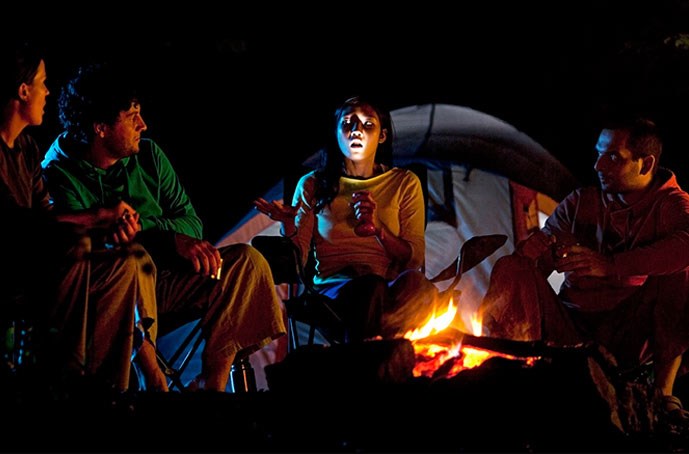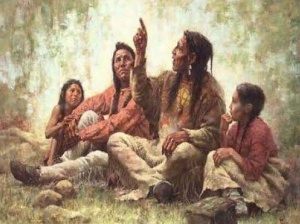Hello, my fellow creatives! Summer has returned to the Midwest at last. While my kids eagerly toss their backpacks into the air crying Hallelujah, I am wrapping up finals while also preparing for the next term. It’s a little scary, changing over terms, but, you know…we manage somehow. 🙂
But all this monsterly ruckus does not mean we cannot think of writerly things. In fact, I was fortunate enough to host a virtual Creative Salon for some fellow teachers about the importance of oral storytelling for its cultural, creative, and classroom significance. Let me take you through a few bits of research, perhaps a pondering or two, so that we may all remember just what is treasured–preserved–known through the tradition of oral storytelling.

The oral traditions and expressions include of many spoken such us riddles, proverbs, folklore, tales, legends story, myths, epic songs and poems, charms, prayers, chants, songs, dramatic performances and more. Oral traditions and expressions are used to give information about the knowledge, social and culture values as well as the collective memory.
Cultural Preservation: Rediscovering the Endangered Oral Tradition of Maluku
Think back to your days listening to a story a loved one tells you, or that you told yourself. “Once upon a time”… and off you go into someplace Other and New. Such a common little phrase, isn’t it? We hear it over and over in familiar fairy tells and legends. You can even trim that phrase down further to simply “Once.” Countless stories start at this very moment. These stories come from across land and time to reach us, here and now, and pull us into their “once”: stories of battles waged, quests completed, families reunited.
Or perhaps those stories come from an Elsewhere altogether different: lands of myth and magic, where the Impossible is just as real as you, or you…oooor you!

Campfires call upon that Impossible Magic, don’t they? When the words of a spoken story combine with the sparks and stars, we cannot help but fall under the story’s spell. Such was the way we and others wove with words: summer camp’s ghost stories, Dad’s evening devotions, or the bizarre fairy tales we’d tell ourselves while poking the embers with our sticks still sticky from the last of the marshmallows.
In the time of Dickens, reading aloud at home was very much a common household entertainment. The practice had become broadly accessible in Britain a hundred years earlier, with the spread of literacy and the increased availability of books and periodicals…they saw reading as a pick-me-up and a dangerous influence, a source of improvement, a way to stave off boredom, and even as a health-giving substitute…
The Enchanted Hour
But let us not be so foolish as to suppose the stories told could only be for fun. Telling tales aloud could be extremely instructive, too, for any class. From oral historians describing battles to Caesar as he dined, to the man reading newspapers to Cuban cigar-rollers as they worked, we have depended on the oral storyteller to take us outside of ourselves and witness that which we cannot experience otherwise. It is through the telling of lives that we have learned what it is like to emigrate to a foreign land, to live in a centuries-old slum, to hide in the trenches as bombs decimate the land. Countless cultures have depended upon oral storytelling to preserve their histories and customs, and it is through such practice that modern generations have been able to preserve the ways of their ancestors.

The art of storytelling was practiced by both men and women in Lakota culture and society, where a form of high culture existed prior to the reservation period. Those individuals born in the early part of the twentieth century retained memories of narratives told by grandparents who lived during this “high culture” period, which extended from the time before contact with Europeans to approximately 1850.
George Sword’s Warrior Narratives
Nowadays, Kapata is performed (sung) widely [in Indonesia]. In its development, Kapata helps to carry out the function as the medium to enrich language and literature…Another function of Kapata is a social control function. It can be found in the texts of Kapata such as in Kapata Nasihat in Central Maluku from parents to children or from kings to his people. Kapata [maintains] the sanctity of customs regulations and upholding custom laws in a particular community; and to preserve and maintain custom relations that have been established in a community for years.
Rediscovering the Endangered Oral Tradition of Maluku
Māori who participate in ceremonies and meetings there, descendants of those who composed and passed on the ancient records, know the lineage of their forebears because of often quoted genealogies, which were also preserved in the oral tradition. The words handed down from the ancestors are cherished and kept current in various ways and through new media….The literature that bears the closest relationship to the oral tradition in its original form are the texts that Māori first wrote down from memory or that were written for them as they dictated…
Maori Oral Tradition

The West had shaped the knowledge and discourse about Africa for hundreds of years and it was important to shift that power relationship. Obviously, decades of European colonial incursion and rule needed to be sorted out as it pertained to earlier scholarship….Certainly, African societies have preserved their histories, cultures, and ideas in nonverbal forms in the plastic, musical, dancing, and ritual arts, and these need to be taken into account when seeking a thorough historical picture. This also allows us to understand how earlier events have been reconsidered or even reshaped over time for contemporary purposes.
On the Status of African Oral Tradition Since 1970s: An Interview with Robert Cancel
But what does oral storytelling mean for us in the here and now? Since the professionals cannot make up their minds about listening to stories vs. reading them, let’s just focus on what we get out of oral storytelling as both readers and writers of the present.

Reading becomes a priority again. One of my university colleagues broke down the current literacy plight as an inevitable consequence of the “multimodality” of our entertainment. Once radio and film came to Main Street, people no longer needed newspapers and books like they used to. A representative of Wisconsin Literacy concurred, noting that a child is not raised in a home where reading matters, that mindset is carried into adulthood and passed on to the next generation. This mindset propels that vicious cycle of low-literacy onward: no motivation to read = inability to decipher and synthesize text both simple and complex. Forget research–low-literacy means being unable to properly fill out a job application or understand a medical prescription. Studies shared in The Enchanted Hour show that the majority of a child’s neurological development occurs in the first five years, and when a child watches a video instead of listening to a book being read, that development suffers greatly.
Listening to a picture book being read, however, helps children connect the pictures and words they see with the words they hear. They hear how the words sound, how the sentences sound, and are therefore able to use those words and sentences themselves with confidence. And this isn’t just for kids, by the way. I have recommended my adult learners reading fun stuff for years, and the response is overwhelmingly positive. Reading for fun makes reading for school a smidge easier. Reading for school makes writing for school a smidge easier. Writing for school makes writing for work a smidge easier. Put all those smidges together, and you’ve got yourselves a broken vicious cycle.
If a child sees something in a parent that that child aspires to, he or she will copy that parent and be content.
The Reading Promise
This is another reason why I started my podcast last month: in all my encouragement to students, I was neglecting myself. Story Cuppings became a way for me to not only sample and study stories through reading their first chapters, but to read aloud and experience new language again and again. If you’ve a book–be it one you love, wrote, or both–you’d like me to share on Story Cuppings, just let me know!
Passion swells to share one’s life experience, the struggles here and now. “Once upon a time” is not limited to Past Days or Elsewheres. “Once” means “now” as much as it means “then.” “Once” there is a group of people who struggle, not struggled, against adversity. That “once” takes us to the accounts of individuals in Hong Kong, in the United States, in Myanmar, in Poland, in Mexico. It is through the words of an individual—what they see and hear, what they experience at the hands of others—that we learn of the epic quests and battles of today.
And do not assume “epic” must mean “global stakes.” On the contrary, the most epic victories can be one family, one person, living life one season to the next. Such are the stories we hear at family gatherings, be they around a campfire, kitchen table, or fence post. As fellow Wisconsinite storyteller and documentarian Jeremy Apps explains:
My father and my uncles were storytellers, and so were several of the neighbors in the farming community where I grew up in central Wisconsin. Family members told stories when we gathered for celebrations, birthday parties, anniversaries, and at Christmas and Thanksgiving family affairs. Our farm neighbors told stories during threshing and wood sawing bees, while they waited at the grist mill for their cow feed to be ground, and when they came to town on Saturday nights and waited for their wives to grocery shop. These stories were always entertaining, as many of them had a humorous bent to them, but they were also filled with information—how the cattle were surviving during the summer drought, what price Sam got for his potato crop and how he managed to get that price. How the weather this year was not nearly as bad as the weather twenty years ago. Many of the stories were also sad, such as how Frank was making it on his poor farm since his wife died and left him with three kids to fee and care for.
Telling Your Own Story
When I read App’s words and see his work like A Farm Winter, I see the shine of the pivotal truth he wrote in Telling Your Own Story….
Your stories are snippets of history.
Never, EVER, sell your own story short. Whether you weave your experiences with imagined elements or you stitch the raw details together for all to know, YOUR story matters.
Now, tell it aloud.
Hear the sounds of the words you choose, the rhythm they create like the genealogies repeated by the Maori over and over as the story is told by the teller. Listen to the nuances of your characters’ voices–what words embody the tones you use when your voice dresses up as each character? What words bring sensory feeling to the settings you describe?
There is beauty in your story’s language, my fellow writers. Share it with the sparks and stars, and see its magic pass from one generation to the next.~

~COMING SOON!~
Would you believe I’m actually working on a humor writing workshop for my university this summer? I’m still working out how I got roped into that, too. Plus we need to FINALLY talk about the process of choosing character names. Let’s not forget studying those character archetypes that cross time and culture! There’s lots of literary fun to share over the coming months, not to mention some more kickin’ author interviews.
Read on, share on, and write on my friends!



What I rather like about traditional storytelling is that you don’t necessarily hear the same tale twice. Variations and additions come to flatter the original…the original generally being the ‘best’. One only has to think child and parent at bedtime…boy did I fabricate so many of those night-time tales. Kid asks for the same tale parent made up the previous night; parent…generally to avoid abject boredom…agrees yet adapts thus ensuring sanity and giving kid a good surprise…mostly. Regards, The Old Fool
LikeLiked by 3 people
Oh yes! You are absolutely right–stories change and twist a bit depending on the teller, like we each need to put our own little thumbprint on it. It’s what makes any tale unique to the family, I’d say. xxxxx The Young Fool 🙂
LikeLiked by 2 people
What a fab post, truly and so true. Abso love this post Jean, well done. I’m sitting here minding old stories my Nannie told me about her life.
LikeLiked by 2 people
Much kindness, Shey, thank you! xxxxxxxxx You must record those stories for your grandbabes–and your own stories, too! Tales of boards trod, of moss monsters, of hamstahs bent on world domination…
LikeLiked by 1 person
Lol.. the thing is you just think fo them as life don’t you. xxxxxxxxxxxxxx
LikeLiked by 1 person
LMAO Very true. xxxxxxx
LikeLiked by 1 person
At some of our libraries you can ‘check out’ a person who will tell some of their life story.
LikeLiked by 2 people
What a fascinating idea! I wish we had something like that around here.
LikeLiked by 1 person
You should suggest it. https://humanlibrary.org/
LikeLiked by 1 person
Awesome, Peggy, thank you! There’s bound to be some wonderful souls that would love to share their lives with us.
LikeLiked by 1 person
Hooray for summer, humor, and Maurice Sendak!
LikeLiked by 1 person
YES! So many wonderful voices to explore 🙂
LikeLiked by 1 person
We’ve been doing a bi-weekly event at work because it’s “One Book One Philadelphia” and it’s been great. We’re reading “The Tradition” by Jericho Brown. You’d like it, Jean. Who knew people would dig poetry?!
LikeLiked by 1 person
How awesome, Pam! I think people would like the wee portions poems are often written in…plus such poems are SO vivid and full of sensory details that people cannot help but connect.
LikeLiked by 1 person
It’s really been a band experience.
LikeLiked by 1 person
Great post, Jean! There are lots of wonderful traditional stories and myths which have been handed down over centuries throughout Southern Africa. Much of the oral traditions are disappearing with the people who’ve been displaced or assimilated, but some have been rescued in wonderful tomes like “Voices Of The San: Living In Southern Africa Today”, a beautiful book which I borrowed from the library a year or so ago. Libraries are doing a lot to engage kids, especially those from the disadvantaged communities, reading and sharing books in their home languages to improve literacy and engender a love of books. Small steps.
Oh, and I adored Alice and the Muppets, Jean! I think I must play it one more time 🙂
LikeLiked by 1 person
Hee hee! That whole episode is a blast. Here’s hardcore Alice Cooper…frolicking about with a bunch of Muppets. 🙂 I LOVE that your libraries are doing whatever they can to preserve history! It really takes one generation to sit with those who remember and copying what they say. I read this about the Lakota as well as historians in Canada who made a point to visit WWI veterans, and then they started meeting with others through the decades, including members of the LGBTQ community to preserve how they lived in a prejudicial society. Fascinating stuff!
LikeLiked by 1 person
I’m keeping the PBS video in my bag of teaching tricks. ❤️
LikeLiked by 1 person
Yay!
LikeLiked by 1 person
Seen Alice 3 times now. So love that Muppet episode. I use to do a lot of climbing and the campfire tradition of story and adventure telling was one if the best parts to it. Many characters and adventures never written down but so fascinating and rich. xx
LikeLiked by 1 person
Yes, exactly so! There are sooooo many avenues to explore with oral storytelling, but time is sadly limited. 🙂
LikeLike